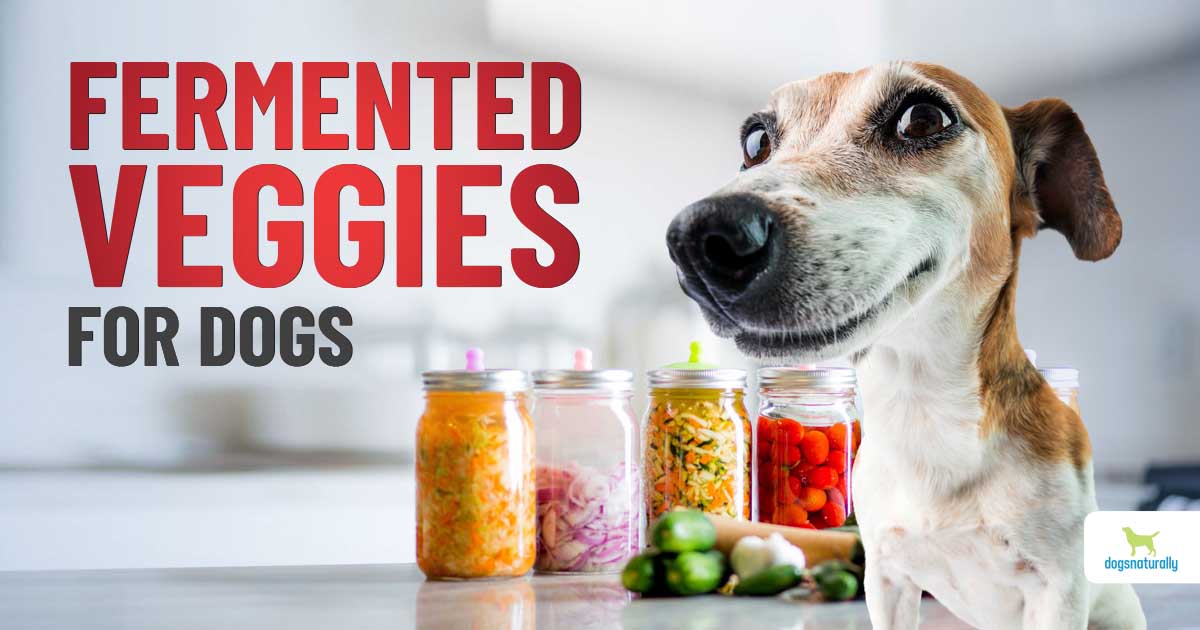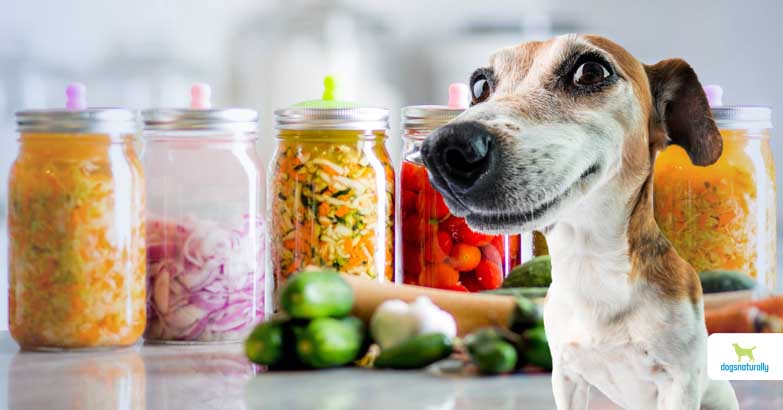As a dog owner, you may be wondering if it’s safe to give your furry friend fermented foods. Fermentation is a natural process that occurs when bacteria or yeast break down the sugars in food, creating beneficial enzymes and probiotics. While fermented foods can be a nutritious addition to a human’s diet, it’s important to understand the potential risks and benefits of feeding them to your dog.
Some fermented foods, such as sauerkraut, kefir, and yogurt, are safe for dogs to eat in moderation. These foods can provide your pet with essential nutrients and support their digestive health. However, other fermented foods, such as sourdough bread, beer, and wine, can be harmful or even toxic to dogs. It’s crucial to do your research and consult with your veterinarian before introducing any new foods to your pet’s diet. In this article, we’ll explore the benefits and risks of feeding your dog fermented foods and provide tips on how to safely incorporate them into their diet.
Yes, dogs can eat certain fermented foods like yogurt, kefir, and sauerkraut. These foods contain probiotics that can help improve your dog’s gut health and digestive system. However, it’s important to introduce fermented foods gradually to your dog’s diet and in small portions. Some dogs may also be lactose intolerant, so it’s best to start with lactose-free options like coconut-based kefir. Always consult with your veterinarian before adding new foods to your dog’s diet.

Can Dogs Eat Fermented Foods?
Fermented foods have been gaining popularity in recent years due to their numerous health benefits. From kimchi to kefir and sauerkraut, many people have added these foods to their diet. But what about our furry friends? Can dogs eat fermented foods? In this article, we’ll explore this topic in detail.
What are fermented foods?
Fermented foods are foods that have been through a process of lacto-fermentation. This process involves the use of bacteria, yeast, or fungi to break down the carbohydrates and sugars in the food. This process results in the production of lactic acid, which acts as a natural preservative and gives fermented foods their tangy flavor.
Some common examples of fermented foods include:
- Kefir
- Kombucha
- Sauerkraut
- Kimchi
Is it safe for dogs to eat fermented foods?
While fermented foods are generally safe for dogs to eat, it’s important to exercise caution. Some fermented foods may contain ingredients that are harmful to dogs, such as garlic or onions. Additionally, some dogs may have an allergic reaction to certain fermented foods.
Before giving your dog any fermented food, it’s important to consult with your veterinarian. Your vet can advise you on which foods are safe for your dog and which should be avoided.
Benefits of fermented foods for dogs
Fermented foods can provide numerous benefits for dogs, including:
- Improved digestion
- Boosted immune system
- Reduced inflammation
- Improved skin and coat health
- Regulated bowel movements
Fermented foods vs. probiotics
Fermented foods and probiotics are often confused with each other, but they are not the same thing. Probiotics are live bacteria that are added to food or supplements to promote gut health. Fermented foods, on the other hand, are foods that have undergone a natural fermentation process.
While both probiotics and fermented foods can provide health benefits for dogs, they work in different ways. Fermented foods contain a variety of beneficial bacteria strains, while probiotics typically only contain one or two strains.
How to introduce fermented foods to your dog
If you want to introduce fermented foods to your dog, it’s important to do so gradually. Start by giving your dog a small amount of the food and monitor them for any adverse reactions. If your dog tolerates the food well, you can gradually increase the amount.
It’s also important to choose high-quality fermented foods that are free from harmful ingredients. Look for foods that are made with organic ingredients and contain no artificial preservatives or additives.
Conclusion
In conclusion, fermented foods can be a healthy addition to your dog’s diet, but it’s important to exercise caution. Always consult with your veterinarian before introducing any new foods to your dog’s diet, and start slowly to avoid any potential adverse reactions. With the right approach, fermented foods can provide numerous health benefits for your furry friend.
Freequently Asked Questions
As a dog owner, you want to provide your furry friend with the best possible nutrition. Fermented foods have become increasingly popular in recent years, but is it safe to share them with your dog? Here are five common questions and answers about whether dogs can eat fermented foods.
1. What are fermented foods?
Fermented foods are those that have undergone a process of fermentation, in which bacteria or yeasts convert sugars into acids, gases, or alcohol. Some examples of fermented foods include sauerkraut, kimchi, kombucha, and yogurt.
While fermented foods can provide a range of health benefits for humans, the same may not be true for dogs. Dogs have different digestive systems and nutritional requirements than humans, so it’s important to be cautious when introducing any new foods to their diet.
2. Can dogs eat sauerkraut?
Sauerkraut is a type of fermented cabbage that is often used as a condiment or side dish. While sauerkraut may be safe for dogs to eat in moderation, it’s important to avoid giving them any sauerkraut that has been seasoned with garlic or onion, as these can be toxic to dogs.
Additionally, sauerkraut is often high in sodium, which can be harmful to dogs with certain health conditions. Always check with your veterinarian before giving your dog any new foods, including sauerkraut.
3. Is it safe for dogs to eat yogurt?
Yogurt is a type of fermented dairy product that can be a good source of protein and probiotics for dogs. However, not all types of yogurt are safe for dogs to eat.
Be sure to choose plain, unsweetened yogurt that does not contain any artificial sweeteners or added sugars. Some dogs may also be lactose intolerant, so it’s important to start with a small amount of yogurt and monitor your dog’s reaction before giving them more.
4. Can dogs eat kimchi?
Kimchi is a spicy Korean dish made from fermented vegetables. While some dogs may enjoy the taste of kimchi, it’s best to avoid giving it to them due to the high levels of sodium and spices that can cause digestive upset.
If you want to incorporate fermented foods into your dog’s diet, it’s best to stick with options that are low in sodium and free of added spices or seasonings.
5. Are there any benefits to giving dogs fermented foods?
Some studies suggest that probiotics, which are found in some fermented foods, may be beneficial for dogs’ digestive health and immune systems. However, more research is needed to fully understand the potential benefits and risks of feeding dogs fermented foods.
If you’re interested in incorporating fermented foods into your dog’s diet, it’s important to do so under the guidance of a veterinarian who can help you choose the best options for your dog’s individual needs.

Dr. Becker Discusses Fermented Vegetables for Pets
As a professional writer, it is essential to provide a comprehensive answer to the question, “Can Dogs Eat Fermented Foods?” The answer is both yes and no. While some fermented foods may be safe for dogs, others can be harmful and lead to severe health issues. It’s important to understand that dogs have a different digestive system than humans, and some human foods can be toxic to them. While fermented foods can provide health benefits, it’s crucial to ensure that they are safe for your furry friend.
Fermented foods like yogurt, kefir, and sauerkraut contain probiotics that can be beneficial for dogs. These probiotics can help to improve their digestive health, boost their immune system, and reduce inflammation. However, not all fermented foods are safe for dogs. Foods like sourdough bread, alcohol, and fermented fruits like grapes and raisins can be toxic to dogs and cause severe health problems. As a responsible pet owner, it’s crucial to consult with your veterinarian before introducing any new food to your dog’s diet.
In conclusion, while fermented foods can provide health benefits for dogs, it’s essential to ensure that they are safe for consumption. As a professional writer, I urge all pet owners to consult with their veterinarian before introducing any new food to their dog’s diet. By doing so, you can ensure that your furry friend stays healthy and happy for years to come.
